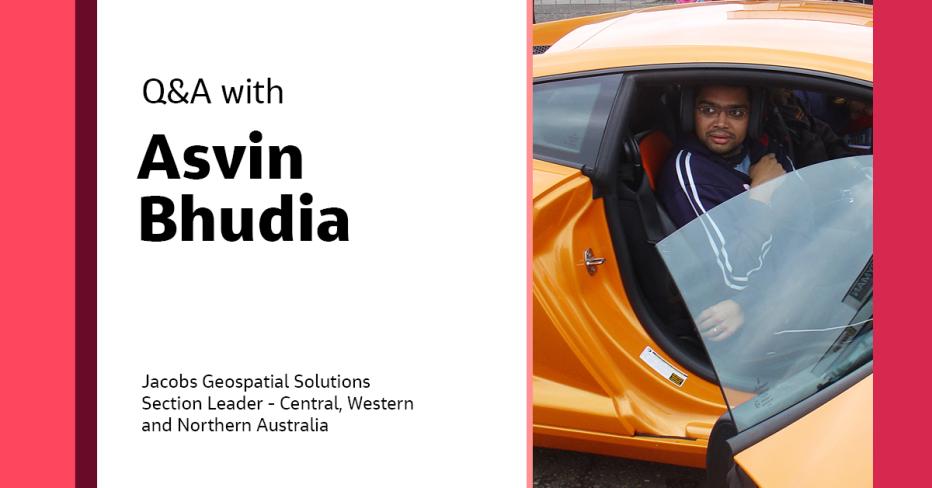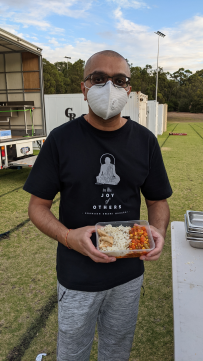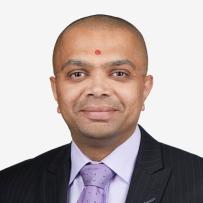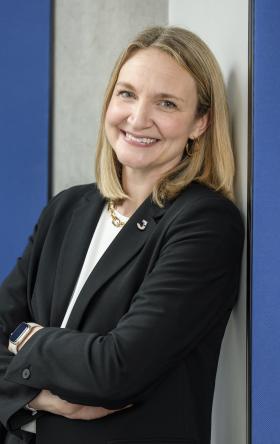We’re living in the era of digital disruption, and we need bold digital and technology leadership now more than ever before. Leading this change demands knowledge, imagination, new thinking, an appetite to reinvent and the courage to challenge conventions. In this series, we're celebrating our team of digital and technology specialists and visionaries, spearheading the development and delivery of our technology-forward solutions for smarter working and better living in Asia Pacific and the Middle East.
For this feature, we caught up with our Geospatial Solutions Section Leader for Central, Western and Northern Australia, Asvin Bhudia, to understand the impact of emerging digital technologies on the geospatial world, the most significant trends, and the future of the geospatial industry.

Let's get to know Asvin:
Hi Asvin! You have been with Jacobs for over 12 years, so tell us a bit about yourself and your role at Jacobs.
I’ve recently been appointed as the Geospatial Solutions - Section Leader for CWN (Central, Western and Northern) Australia. Having been part of the team for the past nine years and a team leader for the last two of those years, this is the next step in my career growth, and I am thankful for this fantastic opportunity.
My background is in software development. I studied computer science with management at Royal Holloway, the University of London (please check out the beautiful campus.) I started working for GamCom Solutions while I was still at university, which was fantastic as it allowed me to apply what I was learning in a real-world environment. Through GamCom, I was fortunate to work with a household name in the U.K., the Nationwide Building Society. It was on this project that I knew this was the career for me. Helping the bank implement process and system improvements, which allowed people to secure mortgages to buy a house, was immensely rewarding.
My wife and I emigrated to Perth, Australia, in 2008. Soon after arriving in Perth, I started working for Sinclair Knight Merz (SKM) (now Jacobs), and it felt like I was ‘home.’ There have been some challenging times along the way, but the one constant has been the support of the people and leadership around me. Working for a global company, I was lucky enough to work with people worldwide, including Chile, New Zealand, and back home in the United Kingdom.
I’ve been part of the geospatial team for the past nine years, working closely with the Public Transport Authority, Western Australia (WA), to help improve their service offering to the people of WA.
How are emerging digital technologies impacting the geospatial industry?
We are collecting more and more data from various sources such as IoT sensors, imagery, crowdsourcing, etc., and geospatial capabilities enable us to bring together these disparate data sources to aid the decision-making process. With advancements in data analytics, machine learning and artificial intelligence (AI), we can get deeper insights into the world around us. Singapore and Saudi Arabia are already examples of data being collated from several sources to help the planning process for growth and new developments. geographic information system (GIS) is now being seen as a core enabler of the implementation process rather than just making maps.
What is the biggest trend you’re seeing in the geospatial world right now and what effect does that have on your work?
Geospatial is a capability that can be applied across industries, and we see a compelling desire to use this capability to integrate various data sources to unlock the true value of that data. This capability is being used in new areas, such as digital twins and smart cities, to provide a more cohesive communication and engagement mechanism.
The technology is now being used to reveal proximity and context-based information rather than providing a single point on a map, i.e., Location Intelligence (where things are in relation to other things.)
In the digital twin world, we are bringing together the gaming world (using the Unreal Engine) and GIS to generate locationally-aware digital twins of real-world assets.
“Geospatial is a capability that can be applied across industries, and we see a compelling desire to use this capability to integrate various data sources to unlock the true value of that data.”
What excites you about the future of geospatial field?
Geospatial is becoming pervasive and is a core part of our work across all markets. Our clients are now asking for (and, in some cases, expecting) more location-aware solutions in our offerings.
At Jacobs, I’m excited to be able to use my experience in software development to drive our growth into emerging markets. Within software development, the core skills of designing and implementing software can be applied across multiple industries. I want to build on that experience to take our geospatial offering into new markets.
You are a ‘Positive Mental Health Champion’ (PMHC) at Jacobs. Why is this important to you and how has the experience been?
Jacobs has a strong culture of caring, and the PMHC program reinforces the importance Jacobs places on the wellbeing of its people. The program is structured with staff taking on volunteer roles to support their colleague's mental health. This fosters a deeper connection between people across geographies and disciplines.
This experience has equipped me with life skills that I use in my personal life and at work to care for those around me.
There has been a focus on our physical safety for a long time. With mental wellness now becoming increasingly important, it's great to be part of a group of like-minded people who genuinely care for each other and look to support those who need it.
Be a part of the journey by joining the One Million Lives initiative, and check your mental health using the check-in tool.
What advice would you give to young geospatial professionals?
Don’t stop learning and trying new things. We live in a world where we can accomplish things that seemed impossible a generation ago – imagine the possibilities in the next 10/20/50 years!
Try and add transferable skills in addition to your technical skills – they will provide opportunities both in the workplace and your personal life.
Finally, seek out mentors and coaches, someone who offers honest feedback and wants to see you reach your goals.
Tell us about a career moment you’re most proud of.
It would have to be a project early in my career when I got an opportunity to lead a team of developers to help our major client through one of their biggest projects. We were given a deadline to deliver a system integration because of a merger, and we needed to triple the team size quickly. As lead developer, I was responsible for supporting the Development Manager in delivering our tasks and ensuring the team could focus on their deliverables. It was my first experience managing a multi-site team and cemented the realization that this was the career for me.
My manager had shown great faith in me and pushed me to achieve things I did not realize I could. I’ve always tried to use that experience to ‘pay it forward’ and help others as I once was.
What is your favorite part of your job?
I love that I can pursue my passions in one role at Jacobs. Since a very young age (when my parents bought me my first computer, an Amstrad with a cassette deck,) I’ve wanted to use technology to solve business problems. With the Information Management team based in Perth, I’ve worked with the Public Transport Authority, WA, for the past nine years to implement several system and process improvements to drive efficiencies.
As a Section Leader, I work with a diverse group of talented individuals - capable of amazing things. I continuously learn from them and aim to provide opportunities for their progress.

Tell us a little bit about what you like to do in your downtime.
My culture is important to me, and I regularly volunteer for the BAPS (Bochasanwasi Akshar Purushottam Swaminarayan Sanstha), a socio-spiritual organization. It has taught me the value of service to society. The guiding motto for the organization is “In the joy of others, lies our own.” It is such a simple phrase, yet it can profoundly impact those around us.
As a family, we enjoy going on walks or gardening together. We relish trying new recipes that don’t always work or look like the original.
I enjoy following football (the English Premier League) and Formula 1. The world of cars excites me, and I like reading about the technological progress in the automotive industry. Over the past few years, I’ve gone down the rabbit hole of detailing. Detailing a car and experimenting with the right products for the job is immensely satisfying.
What do you enjoy most about being part of #OurJacobs?
The culture here is fantastic, from the diversity of our people and the culture of caring to the infinite possibilities for career growth.
Jacobs has a strong diversity and inclusion culture, allowing us to bring our whole selves to work. I am free to be myself at work and practice my religious beliefs – that freedom enables me to focus on delivering my best work. There is a very powerful saying, ‘unity in diversity,’ which I see daily at work.
Having been in the company for over twelve years, there have been numerous times when I’ve needed to attend to family matters (births, deaths or illnesses,) and every time Jacobs has been there to support my family and I. There have been times when I’ve been willing to go above and beyond what was expected of me; however, caring people leaders put my wellbeing ahead of anything else, brought things back into perspective, and empowered me to focus on my family.
Our work helps our clients make a real difference in the world around us. Working for a company that makes the world a better place – is a very gratifying feeling.
About the interviewee

Asvin Bhudia has worked with clients to help them realize business benefits using technology for over 20 years in the U.K. and Australia. He combines strong project management skills backed by technical acumen and analytical skills and strongly believes in using the best technological solutions to deliver business results.
Asvin brings stakeholder management skills, including C-suite executives, to get teams together to achieve their goals and has extensive experience designing and implementing global procedures and managing geographically diverse teams.















































